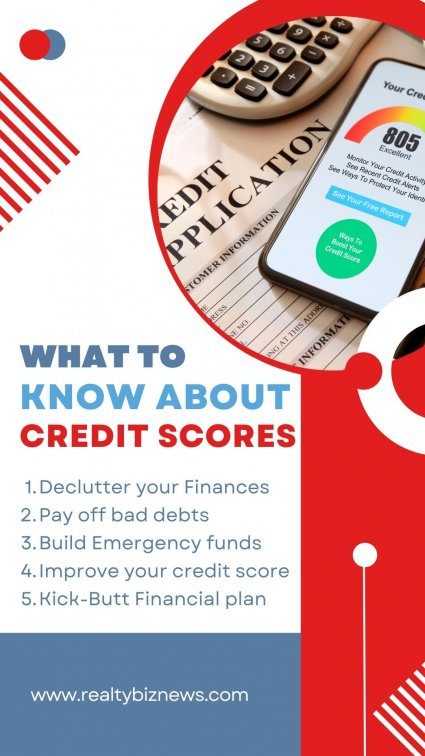Your credit score is essential, but it is easy to overlook. However, a good credit score could mean a difference of many thousands of dollars on a home loan.
One of the questions real estate agents and mortgage brokers get from potential homebuyers is what credit score is needed to buy a house. A better question would be what credit score will get you the best mortgage interest rates!
If you have a better understanding of how credit scores work, you will be able to make better choices to maintain and improve your score. Let's look at the things to know about credit scores that will improve your finances.

Though there is a link between your credit score and your credit report, they are different. Your credit history will be documented in your credit report and include details of your credit history, applications, and debt collection accounts.
On the other hand, your credit score gives a basic summary of the details contained in your report. For example, if you have missed some payments, this will push down your credit score.
Generally, lenders look at credit scores, though any errors in your credit report will be reflected in your scoring. Potential inaccuracy makes it vital to check your credit reports held by the three main credit bureaus and notify them if you find incorrect information.
Five main things factor into your final score. These are:
The three main credit bureaus have to allow you to look at your credit report once a year and for free. Since there are three main credit bureaus, Experian, Equifax, and TransUnion, you could space it out and get a report every four months.
Checking your credit score is also easy, and you should be able to do it through your credit card company.
While credit inquiries temporarily negatively affect your score, this isn't the case when you check your score or receive a credit report.
Also, when you are applying for the same type of loan, you do not get penalized for multiple inquiries. This exemption allows you to compare lenders to get the best deal without impacting your credit score.
If you check your credit report every four months, any negatives issues should show up before they have time to do much damage. Doing so can also prevent you from suffering from identity theft if you notice a mysterious new credit account opened in your name.
You will get lower interest rates and better perks when applying for loans with a better credit score. Over your lifetime, this can save you many thousands of dollars.
Anything you can do to improve your credit score will pay good dividends over the long term. So if there are a few things you could be doing better which might raise your credit score 50 or 100 points, it is certainly worth your while.
The score you receive from the different bureaus isn't likely to be the same as they all use a slightly different scoring model. This can certainly be confusing when looking at scores from various bureaus, but you need to be aware of the difference.
Equifax: 280-850
Experian: 360-840
TransUnion: 300-850
The newer VantageScore also has a different range on their scoring system of 501 to 990.
Buying a home with a lousy credit score will certainly impact what you're actually paying for the home. Your home loan will have a higher interest rate, affecting your monthly mortgage payment.
If you want to buy a home but know your credit score needs some work, one of the best services to help is Credit Karma. You not only can monitor your credit score, but they will give you financial advice on how to increase your credit score each time a credit decision is needed.
For example, if you want to know whether you should pay off a credit card balance, they will answer. Their information can be vital in getting your scores to a place where homeownership is a reality. Best of all, Credit Karma is free to use.
Even if you've made bad decisions in your past, leading to negatives in your credit history, they will be removed eventually. If you make sure you don't repeat those same mistakes, with time, these previous errors won't count negatively towards your score.
If you have a joint account or have an authorized user sharing your credit, any adverse history they have won't directly affect you. If this person makes mistakes with your account, like running up a large balance, it will become your problem.
While lenders place a lot of importance upon your credit score, they might consider other things as well. If you have poor credit, you might be able to get credit through a local bank or credit union, where more information might turn things in your favor.
Explaining why your credit score doesn't look good directly to the person who makes the decision could mean you get a positive result. If the lender holds the home loan, it will increase your chances of procuring financing.
Before going into escrow on a home, it makes sense to put your best foot forward and work on your overall financial picture. Doing so could put you in a much better position to feel at ease with your purchase and not worry at night that you'll be able to pay all your associated home ownership bills.
Best of luck getting your financial house in order!